Related Research Articles

Sind was a province of British India from 1 April 1936 to 1947 and Dominion of Pakistan from 14 August 1947 to 14 October 1955. Under the British, it encompassed the current territorial limits excluding the princely state of Khairpur. Its capital was Karachi. After Pakistan's creation, the province lost the city of Karachi, as it became the capital of the newly created country. It became part of West Pakistan upon the creation of the One Unit Scheme.
Shah Nawaz Bhutto, 8 March 1888 – 19 November 1957, was a politician and a member of Bhutto family hailing from Larkana in the Sind region of the Bombay Presidency of British India, which is now Sindh, Pakistan.

The Government of India Act 1935 was an act passed by the British Parliament that originally received royal assent in August 1935. It was the longest act that the British Parliament ever enacted until the Greater London Authority Act 1999 surpassed it. Because of its length, the act was retroactively split by the Government of India (Reprinting) Act 1935 into two separate acts:

The Provincial Assembly of Sindh is a unicameral legislature of elected representatives of the Pakistani province of Sindh, and is located in Karachi, its provincial capital. It was established under Article 106 of the Constitution of Pakistan having a total of 168 seats, with 130 general seats, 29 seats reserved for women and 9 seats reserved for non-Muslims.
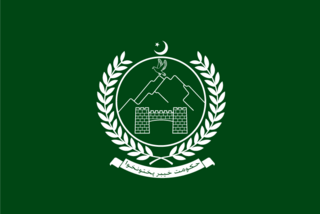
The chief minister of Khyber Pakhtunkhwa is the head of government of the Pakistani province of Khyber Pakhtunkhwa. The chief minister leads the legislative branch of the provincial government, and is elected by the Provincial Assembly. As long as she or he has the confidence of the assembly, a single term in office for the chief minister can be a maximum of five years. There is no term on the number of limits. Ali Amin Gandapur is current chief minister of KPK.
The governor of Sindh is the appointed head of the province of Sindh, Pakistan. The office of the governor as the head of the province is largely a ceremonial position; the executive powers lie with the chief minister and the chief secretary of Sindh.
Sir Ghulam Hussain Hidayatullah KCSI was a colonial Indian and Pakistani politician from Sindh. He held several offices in Sindh including 1st Chief Minister (1937–1938) and being re-elected as 5th Chief Minister (1942–1947).
Khan Sahib Shahal Khan Khoso (1909–1956) came from a family which had, since the many last centuries, been prominent among the landed aristocracy of the Sindh. He was a Member of the West Pakistan Legislative Assembly from 1953 to 1956, belonging to Khoso Baloch family of Thul district Jacobabad Sindh. His grandfather Dilmurad Khan khoso revolted against British in 1857 and was sent to Andaman Island.
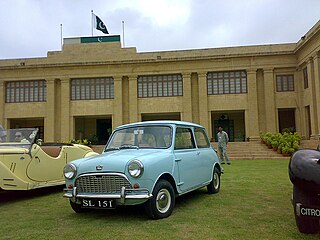
The Governor's House, officially known as Sindh Governor House, and also known by its former names including Government House, Governor-General's House and President's House, is a palace in Karachi, Sindh, Pakistan. It is the official residence of the governor of Sindh. The current governor of Sindh is Kamran Tessori. It is located along the Aiwan-e-Sadar Road of Karachi.
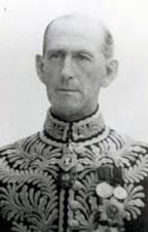
Sir Lancelot Graham, KCSI, KCIE (1880–1958) was an Indian civil servant during the British Raj. He served as the first Governor of Sind from 1 April 1936 to 31 March 1941.

Provincial elections were held in British India in the winter of 1936–37 as mandated by the Government of India Act 1935. Elections were held in eleven provinces - Madras, Central Provinces, Bihar, Orissa, the United Provinces, the Bombay Presidency, Assam, the North-West Frontier Province, Bengal, Punjab and Sind.

Sir Abdullah Haroon was a British Indian politician and businessman who made major contributions towards developing and defining the role of Muslims in economic, educational, social and political fields in the Indian subcontinent.
Bombay Legislative Assembly came into existence in 1937, as the legislature of Bombay Presidency, a province of India. It functioned until 1960, when separate states of Maharashtra and Gujarat were formed.

Assam Province was a province of British India, created in 1912 by the partition of the Eastern Bengal and Assam Province. Its capital was in Shillong.
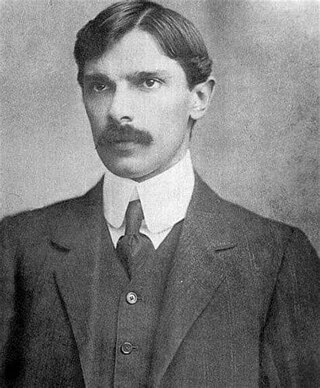
The Sindh assembly was the first British Indian legislature to pass the resolution in favour of Pakistan. Influential Sindhi activists under the supervision of G.M. Syed and other important leaders at the forefront of the provincial autonomy movement joined the Muslim League in 1938 and presented the Pakistan resolution in the Sindh Assembly in 1943. In 1890 Sindh acquired representation for the first time in the Bombay Legislative Assembly. Four members represented Sindh. Those leaders and many others from Sindh played an important role in ensuring the separation of Sindh from the Bombay Presidency, which took place on 1 April 1936.

The Legislatures of British India included legislative bodies in the presidencies and provinces of British India, the Imperial Legislative Council, the Chamber of Princes and the Central Legislative Assembly. The legislatures were created under Acts of Parliament of the United Kingdom. Initially serving as small advisory councils, the legislatures evolved into partially elected bodies, but were never elected through suffrage. Provincial legislatures saw boycotts during the period of dyarchy between 1919 and 1935. After reforms and elections in 1937, the largest parties in provincial legislatures formed governments headed by a prime minister. A few British Indian subjects were elected to the Parliament of the United Kingdom, which had superior powers than colonial legislatures. British Indian legislatures did not include Burma's legislative assembly after 1937, the State Council of Ceylon nor the legislative bodies of princely states.
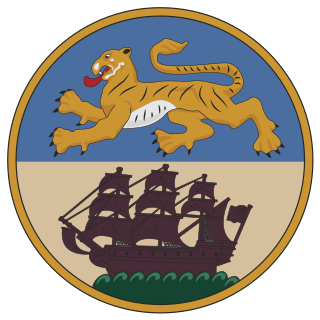
The Bengal Legislative Assembly was the largest legislature in British India, serving as the lower chamber of the legislature of Bengal. It was established under the Government of India Act 1935. The assembly played an important role in the final decade of undivided Bengal. The Leader of the House was the Prime Minister of Bengal. The assembly's lifespan covered the anti-feudal movement of the Krishak Praja Party, the period of World War II, the Lahore Resolution, the Quit India movement, suggestions for a United Bengal and the partition of Bengal and partition of British India.
Sindh Land Alienation Bill of 1947 was a piece of legislation introduced by the British Sindh Assembly, with the aim of returning the mortgaged land to the owners, Similar to the Punjab Land Alienation Act of 1900.
Abdul Sattar Pirzada was a Pakistani politician and administrator who served as the Chief Minister of Sindh between May 1953 and November 1954. He also served as the Chairman of the Pakistan Cricket Board (PCB) between September 1951 and July 1953 before becoming chief minister. His son, Abdul Hafeez Pirzada, is known as the architect of Constitution of Pakistan.
References
- ↑ "Government of India Act 1935" (PDF).
- 1 2 3 "First Assembly of Sindh" (PDF).